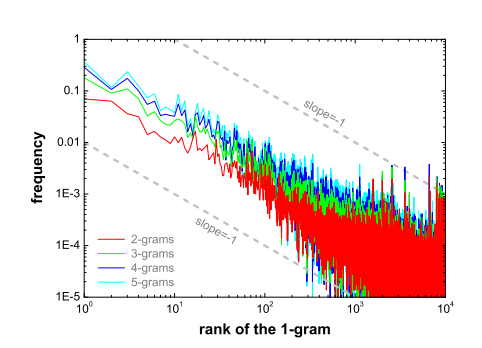The Evolution of English Words and Phrases Since 1520
The digitisation of the world’s books reveals how the popularity of English words and phrases has evolved since the 16th century. And the database is now freely browsable online

Last year, the Google Books team released some 4 per cent of all the books ever written as a corpus of digitised text, an event that has triggered something of a revolution in the study of trends in human thought. The corpus consists of 5 million books and over 500 billion words (361 billion in English) dating from the 1500s to the present day.
In a single stroke, this data gives researchers a way to examine a whole range of hitherto inaccessible phenomena. Since then a steady stream of new results has emerged on everything from the evolution of grammar and the adoption of technology to the pursuit of fame and the role of censorship.
Today, Matjaz Perc at the University of Maribor in Slovenia uses this data to examine the evolution of the most common English words and phrases since 1520.
As expected, the results show various power laws at play. Power laws are thought to arise in social systems because of a phenomenon of self-organisation called preferential attachment.
This is the idea that in a network, a node with more connections is likely to attract more connections in future. That’s why it is also known the rich-get-richer effect or the Matthew effect (a biblical reference).
So it’s really no surprise that the popularity of words and phrases over time follows a similar law, given that the spread of language can be modelled by a network model.
What’s interesting about Perc’s work, however, is that he’s published the results on his website at http://www.matjazperc.com/ngrams/evolution.html.
Here you can see lists of the top 100 most popular 1, 2, 3, 4 and 5-word phrases for each year of data from 1520 until 2008.
It makes for fascinating browsing. For example, the most popular 5-word phrase in 1520, the first year for which data is available, is “the pope and his followers”. In 2008, the last year for which data is available, it is “at the end of the”.
Worth a look if you have a few minutes to spare.
Ref: arxiv.org/abs/1212.1709: Evolution Of The Most Common English Words And Phrases Over The Centuries
Keep Reading
Most Popular
Large language models can do jaw-dropping things. But nobody knows exactly why.
And that's a problem. Figuring it out is one of the biggest scientific puzzles of our time and a crucial step towards controlling more powerful future models.
How scientists traced a mysterious covid case back to six toilets
When wastewater surveillance turns into a hunt for a single infected individual, the ethics get tricky.
The problem with plug-in hybrids? Their drivers.
Plug-in hybrids are often sold as a transition to EVs, but new data from Europe shows we’re still underestimating the emissions they produce.
Stay connected
Get the latest updates from
MIT Technology Review
Discover special offers, top stories, upcoming events, and more.